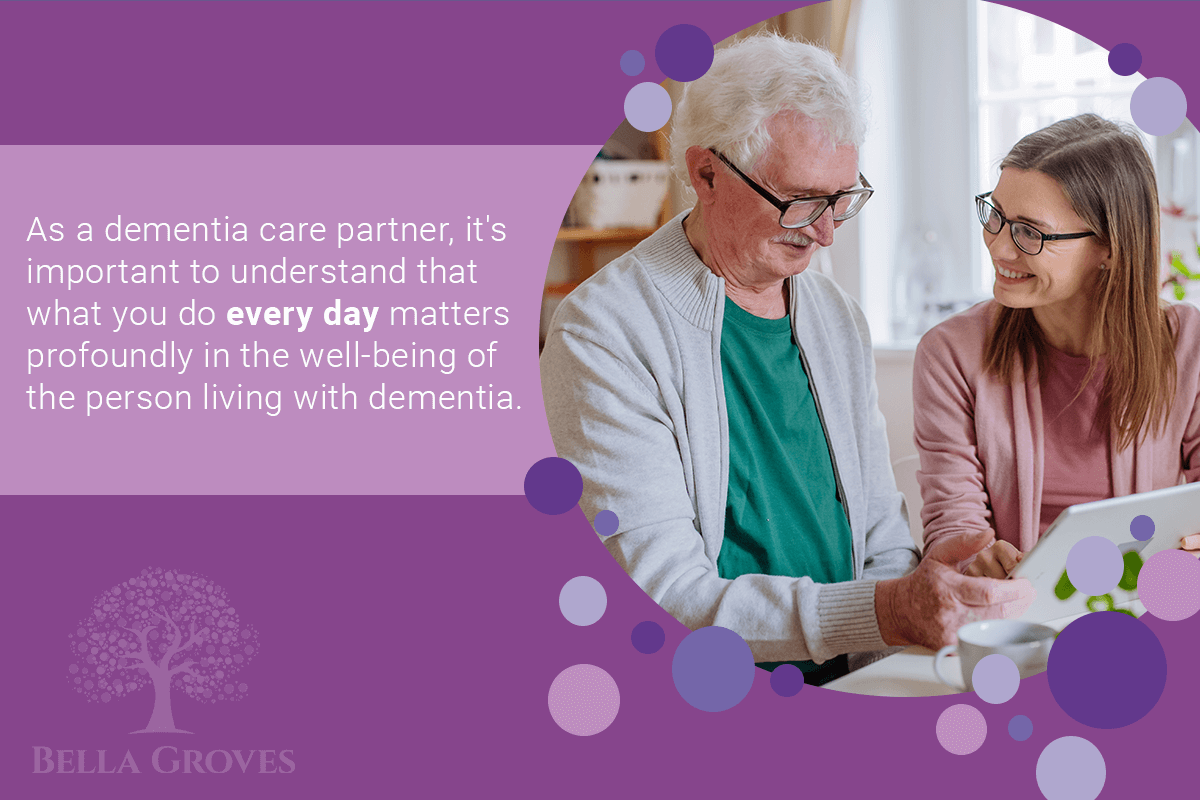
5 Things to Do Every Day When Providing Dementia Care
If you’ve found yourself in the role of a dementia care partner for someone you love, you’re on a journey that requires patience and empathy, and it’s important to understand that what you do every day matters profoundly in the well-being of your loved one.
As a result, our Bella Groves is sharing everyday actions that guarantee comfort, happiness, and moments of success.
1. Never Stop Learning
Understanding dementia is the cornerstone of effective caregiving. Each form of dementia—be it Alzheimer’s, vascular dementia, or another—presents distinct challenges and patterns of progression. By educating yourself about dementia, you not only gain insights into the condition but also come to terms with how to better adapt your care to meet individual needs.
Begin your journey by learning the fundamentals of dementia: its symptoms, causes, and available treatments. Resources from established medical institutions and organizations, such as the Alzheimer’s Association, as well as our online resources at Bella Groves, offer a wealth of information for caregivers.
Once you have a foundational understanding, explore tips, advice, and specialized techniques that can make caregiving more effective and less challenging.
Dementia care is a collaborative and fluid experience, and knowledge is a critical part of this journey.
2. Establish a Routine
Predictability and structure are invaluable to individuals with dementia. Establishing a daily routine provides a sense of security and helps to minimize anxiety. To begin, create a schedule for daily activities, mealtimes, and even times for resting, and stick to it as closely as possible.
Remember that consistency will help anchor your loved one’s sense of time while promoting a feeling of control over their environment.
Incorporate activities that stimulate cognitive function, such as puzzles, music, or simple daily tasks. These exercises can help maintain mental acuity, memory recall, and emotional well-being.
3. Practice Patience and Empathy
Dementia often comes with its share of challenging expressions or behaviors. Your response, rooted in patience and empathy, is crucial to maintaining a positive and supportive environment.
When faced with agitation or aggression, remain calm and avoid confrontational responses. Seek to understand and address the underlying cause of the situation, which could be pain, discomfort, or an unmet need.
Every interaction with a person living with dementia is an opportunity to provide compassionate care. Simple gestures, like a gentle touch or a kind word, can convey a sense of safety and reassurance and strengthen the bond that you and your loved one share.
4. Foster Communication
Dementia can impact a person’s ability to communicate verbally. As a care partner, it’s essential to find alternative means for effective communication.
Learn and practice methods such as speaking slowly and clearly, using short sentences, and maintaining eye contact. These techniques can significantly improve the quality of communication between you and your loved one.
Incorporate non-verbal cues, like facial expressions and body language, to help convey messages and emotions. Be receptive to the person’s non-verbal communication as well—sometimes, actions speak louder than words.
5. Take Care of Yourself
The health and well-being of the care partner are just as important as those being cared for. Ignoring your own needs can lead to caregiver burnout, which ultimately affects the quality of care you provide. Studies have shown that over 60% of caregivers experience some form of burnout, facing symptoms like:
- Exhaustion and fatigue
- Emotional and physical withdrawal
- Loss of interest in activities
- Changes in sleep patterns and appetite
Incorporate daily self-care practices into your routine, even if it’s just a few moments to yourself. Engage in activities that relax you and help manage stress, such as meditation, exercise, or a hobby.
Don’t hesitate to seek help from family, friends, or professional caregivers. Remember, it’s okay to ask for assistance, whether that means taking a break for a few hours or making the decision to move a loved one to a memory care community.
Love > Dementia
The daily checklist for dementia care partners is not a list of chores—it’s a roadmap to ensuring that every day is filled with joy and comfort. Remember that even the smallest of tasks, when done with love and attention, can make an immense difference in the lives of those living with dementia.
If someone you love is living with advanced dementia and you no longer feel equipped to provide care, consider Bella Groves. We’ve created our memory care community to be the kind of place we want our own family members to live in someday. Each of our team members has been impacted by dementia – whether personally or professionally – and we believe we have a higher calling than just “taking care” of people. Our purpose is a community of unconditional joy.
Dementia will progress; we’re here to progress with you. If you have questions about your dementia care journey, we invite you to call us at (830) 323-0440 or email us at hello@bellagroves.com.


